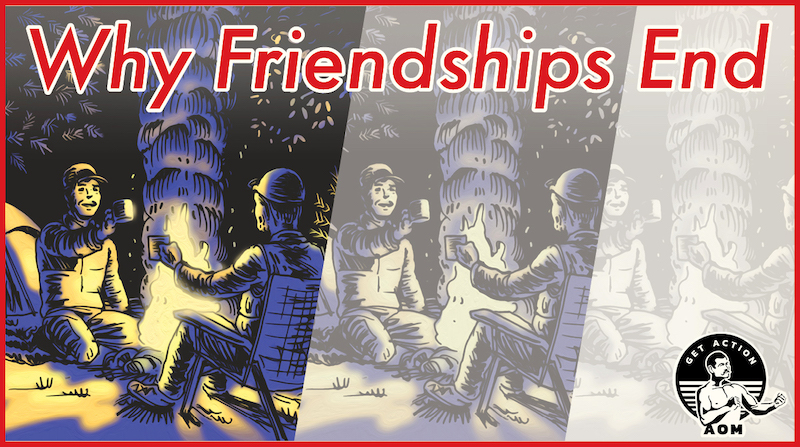
With many relationships, the reasons they end are clear.
Two people who are dating realize they’re not compatible in some way and don’t have a future together.
A married couple decides they can’t stand living with each other anymore.
Business partners split to pursue divergent goals.
A boss fires an employee for stealing from the company; or an employee quits when his boss doesn’t give him a desired promotion.
Why a friendship ends isn’t always so obvious, however, nor is how one ends; while with the above relationships, there’s an explicit moment, a concrete event that terminates the bond — a DTR, a divorce, the revising of a contract, etc. — with friendship, no such sanctioned ritual exists.
Why a friendship dissolved, and whether or not it is or isn’t still extant, can thus remain something of a mystery.
To unravel this mystery, and help all of us better understand the dynamics behind the unique, too-little-considered relationship of friendship, I spoke with Bill Rawlins, a professor of communication at Ohio University who has spent his career studying the subject. If you haven’t already, I highly recommend you listen to the podcast I did with him about friendship. It’s one of my favorites.)
The Ambiguity of Friendship
To understand why friendships rarely have a clear, explicit ending, you first have to understand the distinctive nature of friendship.
“Friendship is not sanctioned in the same way as other relationships are. Friendships rest on a kind of mutual covenant, but it’s many times not explicitly stated,” Bill told me.
Marriages and business partnerships have explicit covenants. All the parties know when the relationship has officially started and the terms of the relationship. Because they have explicit beginnings, they also have explicit endings.
Not so with friendships.
You usually don’t tell people, “Hey, we’re officially friends now, and this is what I expect of you, and this is what you can expect of me.” Instead, friendships slowly grow into existence through regular contact between two people who have mutual regard for each other. At some point, there’s a joint (but unspoken) understanding that you’re friends.
Without a definite idea of what the obligations of a friendship are, and thus if they are or aren’t being fulfilled, it’s hard to know if a friendship should be ended, or has ended. Thus friendships fade into existence and then often fade out of existence.
If you dig into this ambiguity further, however, you’ll find there are typically three reasons why — even if you’re not 100% sure you and someone else aren’t friends anymore — that your relationship has definitively eroded.
The 3 Reasons Friendships End
Loss of Commonalities
What makes friendship so unique as a relationship is that friends freely choose each other, based on nothing other than mutual interests, admiration, and affection. The relationship isn’t entered into for financial gain, as in business partnerships; isn’t bound by blood, as in familial ties; and isn’t propelled by sexual attraction, as in romantic relationships. As Rawlins explained on the podcast, people don’t become friends with someone for “categorical reasons,” but simply “because
No comments:
Post a Comment